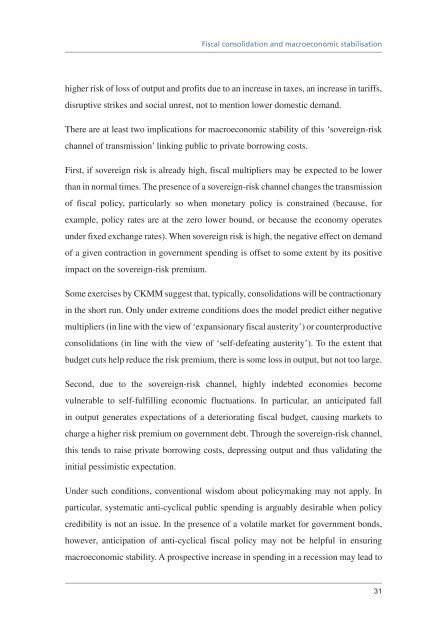Download PDF - Vox
Download PDF - Vox
Download PDF - Vox
- No tags were found...
Create successful ePaper yourself
Turn your PDF publications into a flip-book with our unique Google optimized e-Paper software.
Fiscal consolidation and macroeconomic stabilisationhigher risk of loss of output and profits due to an increase in taxes, an increase in tariffs,disruptive strikes and social unrest, not to mention lower domestic demand.There are at least two implications for macroeconomic stability of this ‘sovereign-riskchannel of transmission’ linking public to private borrowing costs.First, if sovereign risk is already high, fiscal multipliers may be expected to be lowerthan in normal times. The presence of a sovereign-risk channel changes the transmissionof fiscal policy, particularly so when monetary policy is constrained (because, forexample, policy rates are at the zero lower bound, or because the economy operatesunder fixed exchange rates). When sovereign risk is high, the negative effect on demandof a given contraction in government spending is offset to some extent by its positiveimpact on the sovereign-risk premium.Some exercises by CKMM suggest that, typically, consolidations will be contractionaryin the short run. Only under extreme conditions does the model predict either negativemultipliers (in line with the view of ‘expansionary fiscal austerity’) or counterproductiveconsolidations (in line with the view of ‘self-defeating austerity’). To the extent thatbudget cuts help reduce the risk premium, there is some loss in output, but not too large.Second, due to the sovereign-risk channel, highly indebted economies becomevulnerable to self-fulfilling economic fluctuations. In particular, an anticipated fallin output generates expectations of a deteriorating fiscal budget, causing markets tocharge a higher risk premium on government debt. Through the sovereign-risk channel,this tends to raise private borrowing costs, depressing output and thus validating theinitial pessimistic expectation.Under such conditions, conventional wisdom about policymaking may not apply. Inparticular, systematic anti-cyclical public spending is arguably desirable when policycredibility is not an issue. In the presence of a volatile market for government bonds,however, anticipation of anti-cyclical fiscal policy may not be helpful in ensuringmacroeconomic stability. A prospective increase in spending in a recession may lead to31














